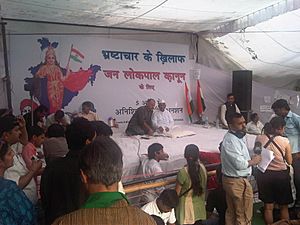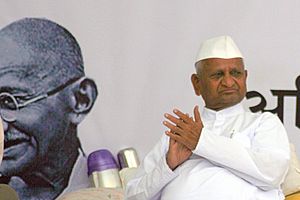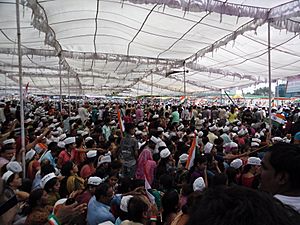Anna Hazare facts for kids
Quick facts for kids
Anna Hazare
|
|
|---|---|
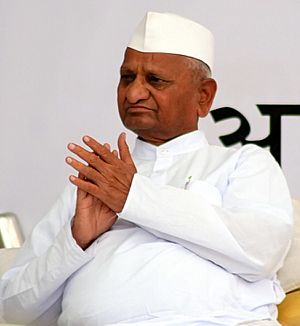
Hazare in 2011
|
|
| Born |
Kisan Baburao Hazare
15 June 1937 |
| Nationality | Indian |
| Other names | Kisan Baburao Hazare |
| Citizenship | Indian |
| Known for | Indian anti-corruption movement – 2012, Indian anti-corruption movement – 2011, Watershed development programmes, Right to Information |
| Movement | Indian anti-corruption movement, Peace movement |
| Parents |
|
| Awards | Padma Shri (1990) Padma Bhushan (1992) |
| Military career | |
| Allegiance | |
| Service/ |
|
| Years of service | 1960–1975 |
| Rank | Sepoy |
| Battles/wars | Indo-Pakistani War of 1965 |
Kisan Baburao "Anna" Hazare (born 15 June 1937) is an Indian social activist. He has led important movements to help villages grow, make the government more open, and fight against corruption. He received the Padma Bhushan award in 1992, which is one of India's highest civilian honors.
In April 2011, Hazare began a hunger strike. He wanted the Indian government to create a strong law called the Jan Lokpal Bill. This law would set up an ombudsman, a special official with power to investigate corruption in public places. His fast led to many protests across India supporting him. The fast ended on 9 April 2011, after the government agreed to his requests. They formed a committee with government and public representatives to write the new law.
Contents
- Early Life and Education
- Military Service and Inspiration
- Transforming Ralegan Siddhi Village
- Activism for Change
- Exposing Corruption and Threats
- Awards and Recognition
- Personal Life
- Images for kids
- See also
Early Life and Education
Kisan Baburao Hazare was born on 15 June 1937, in Bhingar, near Ahmednagar. He was the oldest of seven children. He later became known as Anna, which means "elder person" or "father" in Marathi.
His father worked hard but struggled to support the family. They moved to their family village, Ralegan Siddhi. Since there was no primary school in the village, a relative took Kisan to Mumbai for his education. However, his schooling stopped in the seventh grade because his relative could no longer afford it. Kisan then started selling flowers in Mumbai and eventually owned two flower shops. He also joined groups that helped prevent landlords from bullying poor people out of their homes.
Military Service and Inspiration
In April 1960, Hazare joined the Indian Army. He started as a truck driver and later became a soldier. He trained in Aurangabad.
During the Indo-Pakistani War of 1965, Hazare was stationed near the border. He was the only survivor of an enemy attack while driving a truck. This experience, along with his earlier life in poverty, deeply affected him. He felt that he had survived for a special reason and decided to dedicate his life to serving others. He found inspiration in the writings of Swami Vivekananda, Gandhi, and Vinoba Bhave. He served in the army for fifteen years, until 1975.
Transforming Ralegan Siddhi Village
After leaving the army in 1975, Anna Hazare returned to his village, Ralegan Siddhi. At that time, the village faced many problems like poverty, water shortages, and crime. The land was rocky, making farming difficult, and many villagers relied on selling illegal alcohol.
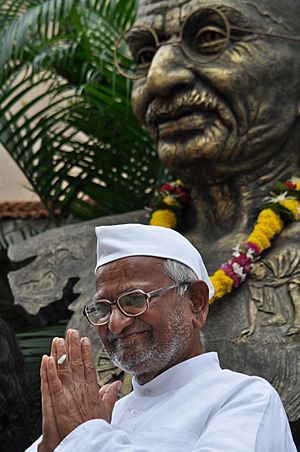
Hazare used his army savings to fix up a damaged village temple. This temple became a meeting place for the community. Many villagers, especially the elderly, helped by donating their time and effort, a practice called shramdaan. Young people also joined in, forming a Tarun Mandal (Youth Association).
Ending Alcohol Use
Anna Hazare and the youth group decided to tackle the problem of alcohol in the village. In a meeting at the temple, villagers agreed to close down liquor shops and ban alcohol. Many illegal alcohol businesses closed voluntarily. The youth group also helped shut down those that did not comply.
The village also decided to ban the sale of tobacco and cigarettes. They collected all these items from shops and burned them in a special ceremony during the Holi festival. Now, tobacco products are no longer sold in Ralegan Siddhi.
Starting a Grain Bank
In 1980, Hazare started a Grain Bank at the temple. This bank helped farmers during droughts or when crops failed. Farmers with extra grain could donate to the bank. When needed, farmers could borrow grain and return it later with a small amount of interest. This system ensured that no one in the village went hungry or had to borrow money to buy food.
Improving Water Supply
Ralegan Siddhi is in the foothills, so Hazare encouraged villagers to build embankments and other structures to collect rainwater. This helped the water soak into the ground, raising the groundwater level and improving irrigation. These efforts solved the village's water shortage.
Farmers also stopped growing crops that needed a lot of water, like sugarcane. Instead, they grew crops like pulses and oilseeds, which need less water. These changes helped increase the amount of irrigated land in the village from 70 acres to about 2,500 acres.
Boosting Education
Ralegan Siddhi had its first primary school in 1932. Villagers later added more classrooms through community efforts. Anna Hazare and the youth group worked to improve education. In 1976, they started a pre-school, and a high school in 1979. They also formed a charitable trust to support these educational efforts.
Ending Discrimination
Anna Hazare helped the villagers of Ralegan Siddhi overcome social barriers and discrimination based on the caste system in India. His leadership inspired people to end untouchability and caste discrimination. Now, marriages of Dalits are held together with other castes, and they are fully included in village life.
Strengthening Village Democracy
Hazare believed in the importance of the Gram Sabha, which is an assembly of all adult villagers. He campaigned for a law that would give villagers more say in their village's development. After many years, the state government made it mandatory for the Gram Sabha to approve spending on development projects in the village.
Activism for Change
Fighting Corruption in Maharashtra
In 1991, Hazare started the Bhrashtachar Virodhi Jan Andolan (BVJA), a people's movement against corruption. He protested against corruption involving forest officials and timber merchants, which led to officials being transferred or suspended.
Hazare also raised corruption charges against government ministers. In 2003, he began a fast unto death to demand an investigation into these charges. He ended his fast after the chief minister formed a commission to look into his claims. The commission's report led to some ministers resigning.
Right to Information Movement
In the early 2000s, Hazare led a movement in Maharashtra that pushed the state government to pass a new Right to Information Act. This act later became a model for the national Right to Information Act 2005 (RTI). This law allows citizens to ask for information from government offices, making them more transparent.
In 2006, when the government tried to change the RTI Act to hide some information, Hazare again went on a fast. He ended his fast after the government agreed to keep the law strong.
Rules for Government Officials
Before 2006, honest government officers in Maharashtra were often transferred, while corrupt ones stayed in their positions for a long time. Hazare fought for a law that would require government officials to complete tasks within a set time and be transferred only after three years. In 2006, Maharashtra passed the Prevention of Delay in Discharge of Official Duties Act, which aimed to make government work more efficient and reduce corruption.
Campaign Against Alcohol from Food Grains
In 2007, Maharashtra introduced a policy to make alcohol from food grains. Anna Hazare opposed this, arguing that Maharashtra had to import food, so using food grains for alcohol was wrong. He went on a fast, and the government promised to review the policy. Although the government later granted many licenses for distilleries, Hazare continued to fight this policy in court.
Lokpal Bill Movement
In 2011, Anna Hazare became a key leader in the 2011 Indian anti-corruption movement. He campaigned for a stronger anti-corruption law called the Lokpal (ombudsman) bill. This bill, known as the Jan Lokpal Bill, was designed to give more power to the ombudsman to fight corruption, even including high-ranking officials.
Hunger Strike for Lokpal
On 5 April 2011, Hazare began an "indefinite fast" in Delhi. He wanted the government to form a joint committee with citizens to draft the Lokpal Bill. The Prime Minister had rejected his demand earlier. Hazare stated, "I will fast until Jan Lokpal Bill is passed."
Thousands of people and many social activists supported his movement. Protests spread across major cities in India. On 8 April 2011, the government agreed to his demands and formed a joint committee to draft the bill. Hazare ended his 98-hour fast on 9 April 2011, setting a deadline for the bill to be passed by 15 August 2011. He called his movement a "second struggle for independence."
Arrest and Public Support
On 16 August 2011, Hazare was arrested just before he planned another indefinite hunger strike. Police said he refused to follow their conditions for the protest. Hazare refused bail and stayed in Tihar jail. News of his arrest led to massive protests across the country. Thousands marched in support, and many were detained. Opposition parties criticized the government's actions.
After four hours, Hazare was released but refused to leave jail until he was given unconditional permission to fast at Ramlila Maidan. Due to widespread protests, the government allowed him to hold a public hunger strike for fifteen days. On 20 August, Hazare moved to Ramlila Maidan, New Delhi, promising to fight until the Jan Lokpal Bill was passed.
Fast at Ramlila Maidan
At Ramlila Maidan, thousands gathered to support Hazare. He continued his fast, losing weight but remaining determined. He stated, "I will not withdraw my hunger strike until the Jan Lokpal bill is passed in the Parliament. I can die but I will not bend." Hazare ended his fast on 28 August, after the Lokpal Bill was passed unanimously. He was then taken to a hospital for care.
"I Am Anna" Campaign
During Anna Hazare's fasts, his supporters started the "I Am Anna Hazare" campaign. People wore special caps that said "I Am Anna," which became a symbol of the movement. This campaign helped spread awareness and gather support.
Later Fasts
On 27 December 2011, Hazare began another 3-day hunger strike in Mumbai for a stronger Lokpal bill. He ended it early on 28 December due to health concerns.
Electoral Reform Movement
In 2011, Hazare also called for a change in election laws. He wanted voters to have the option of "None of the above" (NOTA) on voting machines. This would allow people to show disapproval of all candidates if they didn't like any of them. The Chief Election Commissioner of India supported this idea.
In 2013, Hazare started a journey called Jantantra Yatra to discuss various issues, including the right to reject a candidate in elections.
Protest Against Police Action
On 8 June 2011, Anna Hazare and his supporters held a fast to protest against the police action on another hunger strike led by Swami Ramdev. Hazare believed the police action was an attempt to stop democracy. Many young people joined this protest, inspired by Hazare's nonviolent methods, similar to Gandhi.
In 2013, Anna Hazare's anti-corruption organization announced it would focus on larger issues like the Janlokpal Bill, the right to reject candidates, farmers' problems, and changes in the education system.
Protest Against Land Acquisition Law
In February 2015, Hazare protested for two days in Delhi against a new law about land acquisition. He wanted to ensure that farmers' rights were protected when their land was taken for development.
Exposing Corruption and Threats
Anna Hazare exposed corruption in cooperative sugar factories in Maharashtra. One of these factories was linked to a powerful politician. A person accused in a murder case claimed that this politician had offered money to kill Anna Hazare. Hazare asked the government to investigate, but they refused. He then filed his own complaint. The politician was later arrested and granted bail.
As of December 2011, Anna Hazare received Z+ security, which is a high level of protection, due to these threats.
Awards and Recognition
Anna Hazare has received many awards for his work:
| Year | Award | Awarding organisation |
|---|---|---|
| 2013 | Allard Prize for International Integrity | University of British Columbia Faculty of Law |
| 2011 | NDTV Indian of the Year with Arvind Kejriwal | NDTV |
| 2008 | Jit Gill Memorial Award | World Bank |
| 2005 | Honorary Doctorate | Gandhigram Rural University |
| 2003 | Integrity Award | Transparency International |
| 1999 | Leading Social Contributor Award | Government of India |
| 1998 | CARE International Award | CARE (relief agency) |
| 1997 | Mahaveer Award | |
| 1996 | Shiromani Award | |
| 1992 | Padma Bhushan | President of India |
| 1990 | Padma Shri | President of India |
| 1989 | Krushi Bhushana Award | Government of Maharashtra |
| 1986 | Indira Priyadarshini Vrikshamitra Awards | Government of India |
Films About Anna Hazare
- The Marathi film Mala Anna Vhaychay (I want to become Anna) is based on Hazare's work.
- Anna is a 2016 Hindi-language film about his life.
- Andolan Ek Suruvat Ek Shevat is a 2014 Marathi-language film inspired by Hazare, who also appeared in it.
Personal Life
Anna Hazare is unmarried. He has lived in a small room attached to the Sant Yadavbaba temple in Ralegan Siddhi since 1975. In 2011, he declared his bank balance and money in hand. He owns a small piece of family land, which his brothers use. He also donated other pieces of land given to him for village use.
Images for kids
-
India Against Corruption campaign in Whitefield, Bangalore.
See also
 In Spanish: Anna Hazare para niños
In Spanish: Anna Hazare para niños
 | Delilah Pierce |
 | Gordon Parks |
 | Augusta Savage |
 | Charles Ethan Porter |



